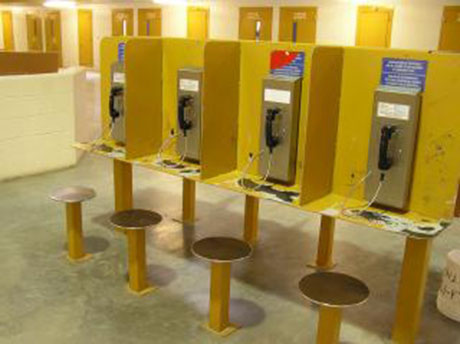A federal ruling will dramatically cut the cost of out-of-state phone calls for Santa Clara County inmates, making it actually cheaper to dial long distance than local. The Federal Communications Commission handed down a directive this month that drops the price for inmates calling to another state by 85 percent, though it’s been met with legal opposition from the phone companies that have a monopoly on jail and prison telecommunications.
“This means that many families will no longer have to choose between talking to their loved ones in prison and paying their utility bills,” FCC Chairman Tom Wheeler said in a prepared statement. “It means that society will benefit from the decreased rates of recidivism that family contact brings. These families can now afford to keep in touch because the era of unreasonable and unjust phones rates has ended.”
Local jurisdictions are now exploring how to bring in-state phone rates to scale with federal standards. Last fall, the county made phone calls for incarcerated youth free of charge after years of pressure from families. And as the FCC cuts the cost of interstate calls by 85 percent, the county is looking at ways to match the price drop locally.
Global Tel-Link, the service provider for the 700 phones at both Elmwood Jail in Milpitas and the main jail in San Jose, is asking a judge to delay the ruling.
The new rates come after nine years of advocacy by inmate rights groups to end what they call predatory and abusive practices by phone companies. Studies have shown that inmates who stay in touch with friends and family are less likely to re-offend, according to the Prison Policy Initiative. According to the FCC, some inmates have had to shell out $17 or more for a 15-minute phone call. The Mercury News reported back in October that one woman paid more than $4,000 over two years to maintain contact with her son. Some $760 of that reportedly went to fees levied by Global Tel-Link.
The new rate places a 21-cents-a-minute limit on pre-paid calls and 25-cents-a minute cap for collect. That puts the price of a 15-minute call at $3.15—more than 80 percent drop. County analyst Fletcher Dobbs says he’s trying to find out if local jails can also charge a connection fee on top of the minute rates.
In-state rates, on the other hand, remain relatively costly until the California Public Utilities Commission steps in to bring them to scale with the new federal standards, says John Hirokawa, the county jails chief. Fifteen-minute calls in-state start at around $4 and tick up with geographical distance.
With the falling price of inmate calls, though, the county has to re-examine ways to fund some inmate services, including vocational training and exercise equipment. Part of the reason phone calls from jail are so expensive—about 23 percent higher than charges for the rest of the population—is because some of the proceeds go to what’s called an Inmate Welfare Fund. The $3.5 million collected from commissary and phone commissions last year pays for a range of services, including religious counseling and parenting classes.
“Obviously, the question would be: Should the commissions be so high?” Hirokawa says. “And then, should we bill the inmates and their families for those services or fund it some other way?”
Some of the program costs could get scaled back by cutting some personnel, he adds. Right now, 41 cents to the dollar goes toward actual services for inmates and the rest to overhead and staffing.
“As we’re collecting these fees and commissions, it would seem we’ve created a bureaucracy to provide those services to those inmates,” Hirokawa says. “Now we’re looking at where to go from here.”
The county is asking for at least two independent audits into the Inmate Welfare Fund to find out if there are better ways to spend the revenue and how to make up the difference after phone commissions take a hit under the new federal ruling.


Long long overdue. But this will only result in an increase in “phone checks” and naturally lead to more inmate violence.
http://www.urbandictionary.com/define.php?term=phone+check
Inmates should not be able to make calls, period. They are in jail for a reason(s).
The “commissary” as institution, should be investigated. I am told by reliable sources that the “commissary” is frought with corruption.
Nice report.
David S. Wall
You’re not paying for the phone calls so don’t worry about it.
There is a very simple solution to avoid needing to pay phone fees…avoid activities that lead to incarceration. It is that simple.
Its the FAMILIES of inmates who pay these exorbitant fees charged by these phone companies, not the inmate, they’re the ones being gouged, not the inmates.
GTL then plows these ridiculously high profits into countless contributions to various politicians nation-wide. The same politicos who are responsible for awarding prison-inmate phone contracts; guaranteeing enormous profits for GTL and perpetuating the cycle.
GTL is by far, the country’s largest correctional phone company, and is for all intents and purposes a monopoly. GTL has some of the worst possible customer service and policies imaginable, coupled with ridiculously poor government oversight….all by design.
How else could these exorbitant phone rates ever been allowed in the first place? All of the rates and fees were signed-off on and okay-ed prior to them being implemented.
Additionally,only a tiny percentage of fees actually are sent back to the prisons for inmate welfare funds, Which, BTW are controlled by prison management who rely on it as a source of funds for overtime for the staff, not materials, supplies, healthcare for indigent prisoners, etc….I once attended an inmate welfare committee meeting at the jail, the only member of the public. Their budget documents proved they spent more on office supplies than went to benefit inmates….it was eye opening.